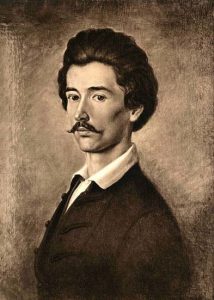Millions of Chinese know the works of this Hungarian poet by heart – video
There was a cult in China at the beginning of the 20th century around Hungarian poet Sándor Petőfi because of his poems about national freedom and modernizing the country. This is why one of his most favourite works, Szabadság, szerelem (Freedom and love), is still in the Chinese school-books.
Hungary was an example for modernization
“Freedom and love
Are dear to me;
My life I give,
Sweet love, for thee,
Yet love I give
For liberty.”
translated by William N. Loew.
This poem is still very popular among the citizens of the Asian superpower, millions of Chinese learn it by heart during their school years – reported hvg.hu. The news portal managed to talk with one of them, Li Chen, who is the European chairman of the One belt, one road initiative and translates Petőfi in his free time. He plans to
publish 170 of his poems in Chinese this year
for the 170th anniversary of the poet’s birth.
He graduated from Beijing Foreign Studies University, where he studied Hungarian and told that Petőfi had many Chinese translators in the last century, but most of them committed many mistakes.
According to Zsuzsanna Csibra, a sinologue at Pázmány Péter Catholic University, Petőfi’s career in China started at the end of the 19th and at the beginning of the 20th century. The cause is quite simple taking into consideration that Petőfi was (and still is) the most well-known poet of the Hungarian revolution and freedom fight of 1848-49. When the idea of
modernizing feudal China
was born around these years, they not only regarded Great-Britain and France as an example but also the small nations of Central- and Eastern-Europe and among them, Hungary.
Petőfi had a message for both Chinese peasants and intellectuals
Furthermore, Chinese people thought that the Hungarians are the descendants of the Huns, so after all, they are somehow related to them. Therefore, the history of Hungary became a good example of how to cooperate successfully with Western powers while coming from the East.
The Chou-brothers, for example, tried to popularize revolution and modernization in imperial China by translating
Finnish, Polish and Hungarian poets.
One of them, Lou Hsun, compiled Petőfi’s first curriculum vitae in Chinese based on Frigyes Riedl’s A history of Hungarian literature published in 1906. This is how the cult started.
Petőfi’s thoughts remained relevant even in the 20s and 30s when the Chinese were fighting for their pure physical existence just like Hungarians did before. However, they did not have a poet who could have addressed both the peasants and the intellectuals, so they often turned to Sándor Petőfi and his poems. Thus, it is not surprising that he had many translators in those years; however,
they just interpreted the gist of his poems
which was, of course, totally unacceptable from an artistic point of view.
The Chinese soulmate of Pefőfi
It was Pai Mang who discovered that Petőfi was not only the poet of love and liberty but also the voice of the Hungarian villages and their poor dwellers. Mang was one of the pioneers of the Chinese socialist lira; he translated 9 of Petőfi’s poems before he was executed by the dreadful Kuomintang. Among these was his version of Petőfi’s Freedom and love, which is popular even today.
Here you can watch how the Chinese ambassador Hsiao Chien recited it in 2013 both in his mother-tongue and in Hungarian:
Source: hvg.hu
please make a donation here
Hot news
What happened today in Hungary – 26 July, 2024
Drama: number of births in a 20-year low in Hungary
Yay or nay? – 6 odd Hungarian delicacies that make our skin crawl
Budapest tourism “exploded” this past weekend
Container transport in Budapest may stop: How will this affect Hungarian economy?
Minister: Hungary will protect its territory by every means possible




